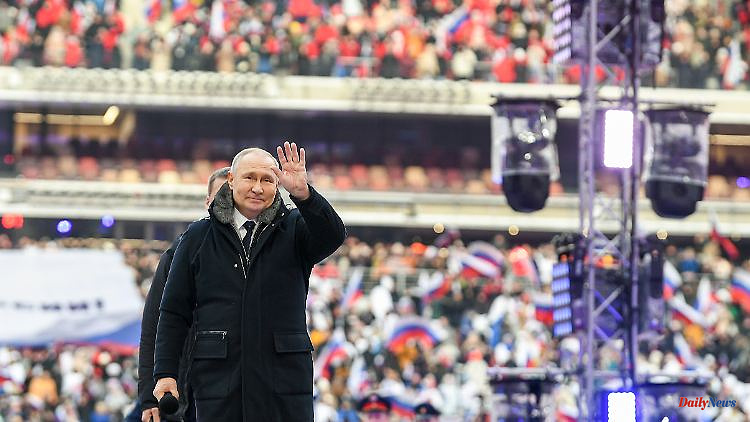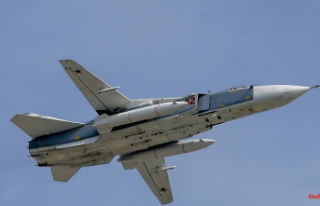Putin didn't want to negotiate before the war, and he doesn't want to now either, says political scientist Thomas Jäger. He rejects the claim that Russia is reacting to NATO's eastward expansion with war: "Russia's security was never in question. Russia's only disputed right is to rule over other sovereign states and to establish a zone of influence in its regional environment."
ntv.de: Let's talk about the causes and a possible end of this war. What are the causes? Who is to blame for this war?
Thomas Jäger: Blame for the war is Vladimir Putin, who ordered the war. He did this for two reasons. One reason is ideological: Putin claims that there is a "Russian world," a protective space for the Russian people that is larger than the Russian Federation. Wherever ethnic Russians live, they are under the protection of the Russian President. This is an expression of a folkish ideology that Russia has been following for quite a while.
And the second reason?
The second reason for the war is that the Russian President's world view is not such that there is a series of sovereign states that exist side by side and all exist with equal rights. Putin believes that big powers have the right to rule over small powers in their regional environment. In his view, Russia has not only the right but also the historical obligation to expand its influence. At least as far as the Soviet Union once ruled.
Isn't that the classic view of a Cold War superpower?
When the world was divided into two blocs, all states were close to either one superpower or another, more or less voluntarily. They lived in their orbit, received protection from them. That's different today. Globalization means that states are much more closely networked with one another, which is why they have more room for manoeuvre. In addition to the major powers, there are regional power poles. The main difference, however, is that Putin is not only concerned with the greed for power, but that he is undermining one of the central principles of the United Nations Charter: the territorial integrity of states. If this revisionism becomes common, other states will also invoke historical borders.
Putin argues that NATO's eastward expansions were a reason for the attack on Ukraine.
This is pure perpetrator-victim reversal. Until 2014, before the Russian attack on Ukraine and the annexation of Crimea, there were no NATO troops in Eastern Europe, even after that there were few. Only in 2022, following the Russian invasion of Ukraine, did NATO increase its presence in Eastern Europe to a relevant number of soldiers. And even these troops pose no threat to Russia.
Why not?
For one simple reason: the security of a heavily armed nuclear weapon state cannot be threatened. Russia's security was never in question. The only thing contested is Russia's right to rule over other sovereign states and to establish a zone of influence in its regional environment: in Belarus, in Ukraine, in Moldova, in Georgia, in Kazakhstan. In each of these countries there were and are forces who say they do not want to live in a Russian satellite state. This is currently being fought out in Ukraine. Kazakhstan has cleverly managed to break away in the slipstream of Ukraine. Belarus didn't succeed, they were annexed coldly.
Does NATO share responsibility, at least indirectly? For example, could war in late 2021 or early 2022 have been avoided through negotiations?
The war could have been avoided, that's right. But not through negotiations, because Russia did not want to negotiate. Russia presented two draft treaties in December 2021 and said: Accept that, then the matter is off the table. In short, these treaties state that Ukraine is under Russian influence and that NATO is withdrawing its structures from Eastern Europe. There would have been zones of different security within NATO - that would have broken the alliance. At the time, the United States offered negotiations: about arms control, about maneuvers, about communication patterns. The answer from Moscow was: That's all well and good. But we don't want to talk about that. Accept what we ask, or leave it.
Does the US have an interest in this war being dragged out? Whatever the outcome, Russia will be weakened militarily and economically.
It is true that after Russia's attack on Ukraine, the United States expressed its interest in Russia being so weakened in this war that it could not immediately attack its neighbors again. But that time seems to have come long ago, judging by the combat capability of the Russian armed forces. In addition, it is to be expected that the states around Russia will arm themselves considerably and obtain security guarantees so that they do not end up in a situation like the Ukraine. In this respect, I do not see that the USA has an interest in a long war. They weren't even prepared for this and now have to rush to produce ammunition to support Ukraine.
Supporters and opponents of arms sales alike emphasize that the war will end in negotiations. Only: when is the time for negotiations?
That came when both sides found out that they themselves weren't really making any headway in the war. Ukraine will not experience complete defeat as long as it has Western support, nor will Russia experience defeat in the war. Russia will not be "defeated" either, but will be prevented from taking land in the Ukraine. All measures, including support from Western countries, are always linked to ensuring that this war is not carried to Russia. Russia is at war without being affected itself.
In negotiations, there is usually a give and take. But the smallest concession to Russia could be taken as a signal that illegal wars of aggression in Europe are worthwhile. How do you get out of this dilemma?
The signal that measures contrary to international law are worthwhile was given to Russia back in 2014. At that time, the West did not react consistently to the annexation of Crimea. No one knows how history would have played out, but without Russia's February 24, 2022 attack, the West would probably have tacitly recognized at some point that Crimea, while not under international law, is actually Russian territory. In the end, the sanctions would probably have simply been lifted. The status of Crimea is only open again after the Russian war of aggression.
How far Russia can be pushed back militarily, when combat power will drop, when the moment comes when factional fighting in the Kremlin might lead to the ruler there seeing an end to the war as a better starting point for maintaining his own power - these are all the questions we are asking today can't answer. The Kremlin is so closed that we don't know what's happening there at the moment. There are some public statements and probably also power struggles. But such observations are a very vague foundation on which to base forecasts.
You wouldn't make a prognosis as to when and how this war will end?
War is an evolving process that can be marked by ruptures and surprises. In this respect, forecasts can only be adjusted. Today it looks like it will be a long war because Russia has no interest in ending it. The duration of the war also depends on who can develop what military capacity in industry. At the moment we are seeing that what was announced weeks ago as a major Russian offensive involving several hundred thousand soldiers does not have the fighting power required to achieve real territorial gains. However, this should not lead cautious observers to say that this will remain the case in the coming months.
Do you have sympathy for people who support the "Manifesto for Peace" because they are simply for peace?
I can well understand that people want to live in peace and that you want peace when there is war. But one should deal with the subject before signing such a manifesto. An end to arms deliveries would mean an end to Ukraine. Therefore: No, I have no understanding for that, because it is ultimately a partisanship with the aggressor Russia.
Hubertus Volmer spoke to Thomas Jäger












